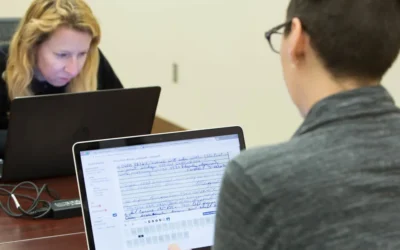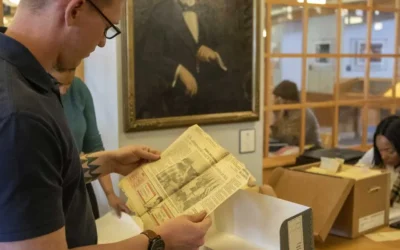Developing Leadership Skills with Archival Projects
Margot Note
Project managers are expected to be both good managers and leaders. Leadership is one of the most critical competencies a project manager must have. Leadership in archival projects is demonstrated through setting the vision for the project and supporting strategy, and creating a shared vision with the team. Archival leaders create an environment that encourages the best in team members, allowing them to develop and learn.
Archival project managers should be knowledgeable in all areas of authority for continuing success. The superficially charismatic manager, for example, may have initial appeal, but as problems arise that they aren’t able to resolve, their power will be undermined. The project manager’s ability is often assessed in regard to how well they influence the behavior of the project team members, and the effectiveness of a leader can be dependent on their power.
Overcoming No Authority
Archival project managers often have little formal authority. Even for project managers with some authority, contributors who report to other managers do portions of project work. Projects with no one in charge are almost certain to fail. Showing leadership in archival projects means that project leaders must assume control whether they possess the authority or not.
Most archival projects involve getting people to do added work on top of their regular operational duties. Project managers display leadership by facilitating decisions, persuading stakeholders, and using their influence to move the project forward. While most project managers cannot wield absolute power to get their way, they can define and role-model the style of behavior wanted from the team, motivate stakeholders, and listen, counsel, and mentor team members.
Influence Styles
To get desired results, archival project managers can use various influence types. They include legitimate influence, which is an authority based on their position within an organization. Similarly, referent influence is power that’s transferred from an executive (usually the project sponsor) to the project manager. Expert influence is clout based on a person’s ability or knowledge. Influence by reward is based on the ability to supply or withhold incentives. Lastly, coercive influence is based on intimidation. One hopes that this type of influence is only reserved for the toughest situations.
Depending on the circumstances, project managers can apply their different styles of influence to match their environment and the personalities of their team members.
Leadership and the Archival Profession
Unfortunately, there are few formal opportunities to develop leadership in archival projects within the profession. The Archives Leadership Institute (ALI), a program funded by the National Historical Publications and Records Commission (NHPRC)—a statutory body affiliated with the National Archives and Records Administration (NARA)—is the standout program. (As a former cohort member, I can attest to its transformational impact).
Leadership development can also happen at the regional, state, or local level, though these prospects can be limited.
Leadership can, however, be developed in the course of an archival project. I’ve found that there’s no better environment for sharpening archival leadership skills than projects. As a archival project manager or a team member, a project is a perfect opportunity to test emerging leadership skills. Projects, because of their temporary nature and opportunities for growth, are catalysts for achievement and excellence.
During a project, project managers, team members, and stakeholders exercise their problem-solving skills, being resourceful and creative in their approaches. Leadership qualities include drive, the ability to take risks, and a sense of the big picture.
Bold and Brave
Archival project managers must be committed to leading their team to success. At times, they must work without high-level support, with active resistance, or in the absence of signs that the project is even possible. Courageous leadership for archivists in the face of obstacles is required.
Margot Note
Similar Posts
Collaborative Archival Relationships
Collaborative projects are instrumental in showcasing how archival collections can benefit various organizational departments.
Informational, Evidential, and Intrinsic Values within Archives
Archives provide authentic, reliable information and hold values that reflect their functions and uses; informational, evidential, and intrinsic.
A Sustainable Archives
Archivists prioritize sustainable practices and policies, rooting their work in ethics of care, often preferring digital processing and preservation
Archival Branding and PR Strategies
Archivists who adopt branding and PR strategies both safeguard historical treasures and contribute to their organizations’ evolution.




Leave a Comment
Comments are reviewed and must adhere to our comments policy.
0 Comments